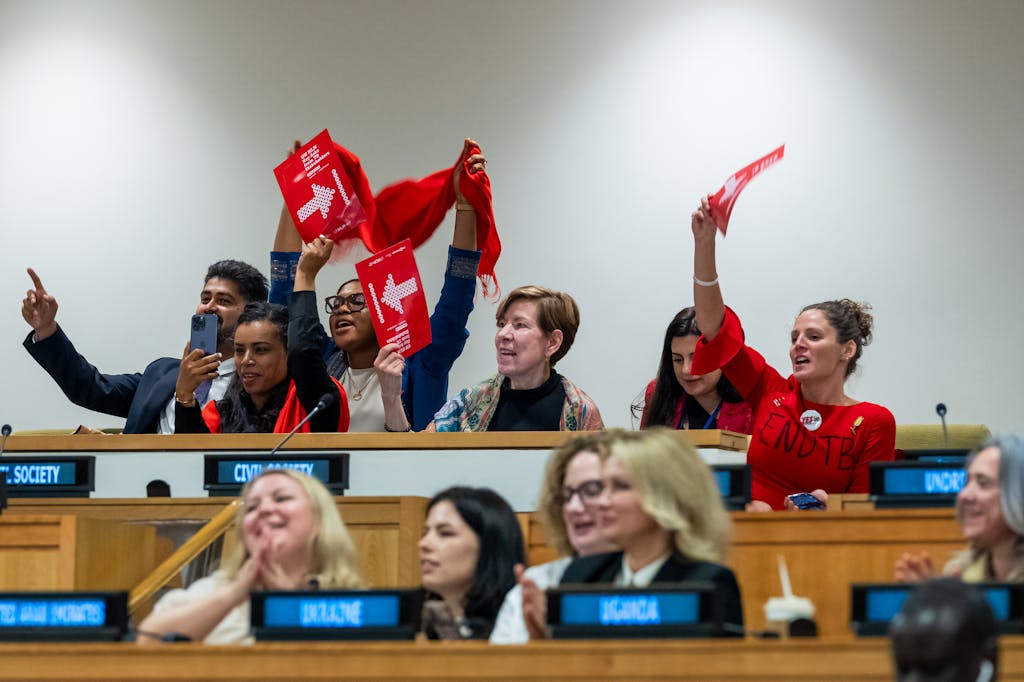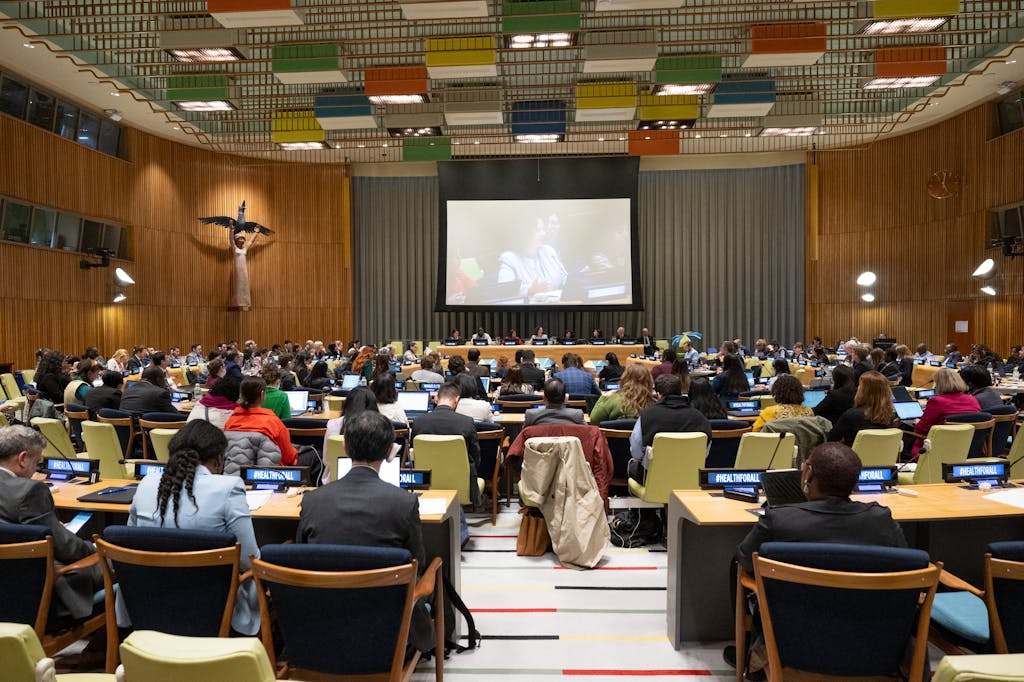Last updated October 3, 2023
Written by: Molly Moss, Global Health Policy Officer, United Nations Foundation
In the third week of September, dignitaries, diplomats, advocates, and experts met in New York for the world’s largest and most inclusive policy forum – the United Nations General Assembly (UNGA). This year’s assembly featured three high-level meetings on health related to pandemic prevention, preparedness, and response (PPPR), universal health coverage (UHC), and tuberculosis (TB). This unprecedented focus on health signals tremendous interest and concern about the challenges and opportunities ahead for protecting public health and realizing the health-related Sustainable Development Goals (SDGs).
On the margins of the official proceedings, high-level officials and policy makers also participated in discussions around the city, which served to advance the global health agenda in other ways. Key themes included driving health technology and innovation, ensuring equitable and timely access to medical countermeasures, and building climate resilient health systems. The medley of conversations that occurred outside UN grounds diversified the health issues under discussion and demonstrated a spirit of cooperation across sectors and geographies to deal with emerging issues.
Inside the UN, there was a certain significance in having three global convenings focused on health, each of which entailed the approval of political declarations. These outcome documents represent an agreement among governments on a vision for working together on these complex health challenges. The big diplomacy moment of UNGA has now passed, and the next step is turning commitments into action and using this year’s work as a foundation for future progress.

The high-level meetings and their respective political declarations were influenced by a range of externalities, including an overloaded UNGA schedule, geopolitical divides that are increasingly affecting health diplomacy, and the inability for most governments to make fresh financial commitments due to shrinking fiscal space. Despite these significant challenges and the strained diplomatic climate, the UN’s 193 Member States reached consensus on three political declarations, and this point should not be under-appreciated. Though the texts generally made incremental contributions to their respective agendas, there are some highlights to note.
Through 27 individual references across the three declarations, health workforce strengthening issues got a big boost. In their remarks during the meetings, countries almost unanimously recognized that a resilient health workforce underpins all efforts to improve and protect population health, and recognized community health workers as critical actors that are uniquely capable of reaching the most vulnerable and underserved populations.
The declarations also provided strong endorsements for primary healthcare (PHC) as a cornerstone for achieving the SDGs with 33 mentions in the texts. Numerous Member States took the floor to share strong positions on PHC as the most efficient and effective pathway to achieving UHC and pandemic readiness and delivering people-centered services. And with 35 references, the issue of mental health moved from a topic of adjacent importance to a central concern. Argentina and South Africa mentioned their own domestic efforts on mental health, and the United States also cited it as a priority.

There were more fraught issues that did not see the same measure of support through these processes. The divide between developed and developing economies on achieving equity in health was a prevailing theme throughout the high-level meetings and the negotiations that preceded them. The hugely contentious topic of intellectual property and technology transfer to diversify production of medicines and vaccines spotlighted this gulf. The UHC political declaration made the most progressive contribution to this issue by encouraging “voluntary licensing, where possible, in agreements where public funding has been invested in research and development for pandemic prevention, preparedness and response” (paragraph 74).
During the high-level meetings, developing economies like Bangladesh called for greater solidarity and international cooperation on this issue, while the European Union maintained its position that technology transfer can only be done on a “voluntary basis, under mutually agreed terms, and fully aligned with intellectual property rules.” These positions are consistent with what is being expressed in Geneva through the pandemic accord and International Health Regulations (IHR) amendment negotiations. In their remarks from the floor during the PPPR meeting, Member States were emphatic about recognizing the UN bodies in Geneva, namely the World Trade Organization, World Intellectual Property Organization, and World Health Organization as the primary forum for debating the norms on this issue.
Many countries expressed serious concern about allocating increased financing to health budgets and referenced broader conversations about the fiscal crisis in many countries and the imperative of reforming the global financial architecture. Throughout the meetings, many developing countries called for tackling the high cost of debt by establishing better lending terms, massively scaling up affordable long-term financing, and increasing concessional financing. While developing economies appealed for greater solidarity and international cooperation on financing, a few high-income countries offered new financial pledges, albeit not in the context of the high-level meetings.
Elsewhere during UNGA, the UK shared details of a significant new investment package that will include roughly £500 million to tackle future pandemics, boost research into vaccines, reduce deaths from infectious diseases, and end preventable deaths of mothers, newborns and children. The United States, through USAID, announced more than $23 million to support countries in fighting TB and reaching global targets set by the new political declaration.
One of the greatest criticisms of these processes from non-governmental stakeholders relates to the insufficiency of concrete targets by which to measure progress. “What gets measured gets managed” was spoken like a mantra in conference rooms and plenary sessions across New York City last week, but for the most part, the political declarations lack commitments to specific criteria of success. The TB text was an exception, in part because it benefitted from the inclusion of evidence-based targets set in other documents, including the 2018 political declaration. The 2023 TB declaration included clear commitments to reducing disease incidence and mortality, providing quality services to TB patients, and enhancing R&D for new vaccines, which were lauded by advocates.
There are more high-level meetings on health in the pipeline for future UNGAs, including antimicrobial resistance in 2024 and non-communicable diseases in 2025. But given the mixed success this year, some are asking if there are diminishing returns on the value of these health meetings in New York. The 2023 meetings saw limited participation from the audience they are meant to attract – heads of state and government. Thirteen heads of state attended the PPPR meeting, ten joined for UHC, and just two attended the TB meeting. This is in part due to scheduling constraints and the typical attrition that occurs over the course of high-level week, but the relative absence of political muscle did not go unnoticed.
As for the next cycle of meetings for these issues, the PPPR and UHC political declarations mandate meetings on those issues in 2026 and 2027, respectively. The TB declaration also signals intent to hold a review meeting in 2028. Each of these processes is likely to generate additional political declarations, which provide further opportunities for Member States to create and commit to strong health policy in this critical forum. By doing so year after year, Member States gradually develop a body of global health principles and standards that have potential to make sustained, meaningful impact over the course of decades.
With this year’s convenings now in the rearview mirror, the hard work of implementing the vision of the political declarations begins. The declarations will be formally adopted by the General Assembly in a procedural session scheduled for October 5, 2023. Then, Member States must carry the mantle of responsibility through their own ministries of health and finance to meet the aspirations of these declarations. Along the way, civil society will keep a close eye on countries’ implementation efforts and advocate for even greater strides in performance.
Looking ahead, the full spectrum of stakeholders will have to press forward on the health agenda to keep it politically salient amid competing interests and polycrises. Though there is much more work to be done, the high-level meetings in 2023 served an important role upholding the importance of health – and SDG3 – as a cornerstone of global development and prosperity.
Molly Moss covers policy issues related to global health governance, antimicrobial resistance, and Universal Health Coverage. Molly manages the Foundation’s official relations status with the World Health Organization and also supports engagement on health issues among UN Member States in New York. Prior to the UN Foundation, Molly worked for the Center for Global Health at the University of Colorado, focusing on immunization, pediatric infectious disease research, and research ethics. During her time at the University of Colorado, Molly earned her Master of Public Health in community and behavioral health. She holds a bachelor’s degree in medical anthropology from Hampshire College.
To get the latest Global Health news from experts like Molly, subscribe to our monthly newsletter.